What do you think?
Rate this book


428 pages, Paperback
First published January 1, 1982
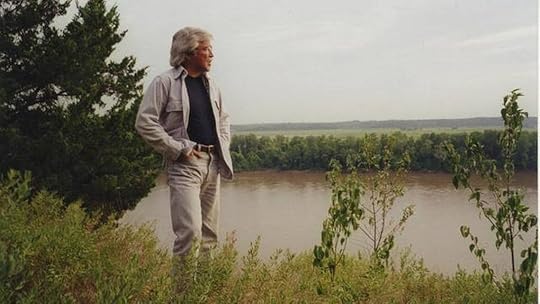
"I had no idea whether people in rural America would open up to an intinerant, a fellow more lost than otherwise. Wouldn't their suspicions of a bearded stranger stifle any attemps to talk with them about their lives? I had not then heard novelist John Irving's assertion that there are, at the of heart of things, only two plots, two stories: a stranger rides into town, a stranger rides out of town. Without knowing it, I had a chance for both."He would remember the lines from a Navajo Wind Chant:
" Then he was told:
Remember what you have seen,
because everything forgotten
returns to the circling winds."
" My wife, a woman of striking mixed-blood feautures, came from the Cherokee. Our battles, my Cherokee and I, we called the 'Indian wars.'His pseudonym has a charm of its own. William Least Heat-Moon, byname of William Trogdon is an American travel writer of English, Irish and Osage Nation ancestry. He is the author of a bestselling trilogy of topographical U.S. travel writing.
For these reasons I named my truck Ghost Dancing, a heavy-handed symbol alluding to ceremonies of the 1890s in which the Plains Indians, wearing cloth shirts they believed rendered them indestructible, danced for the return of warriors, bison, and the fervor of the old life that would sweep away the new. Ghost dancers, desperate resurrection rituals, were the dying rattles of a people whose last defense was delusion -- about all that remained to them in their futility."
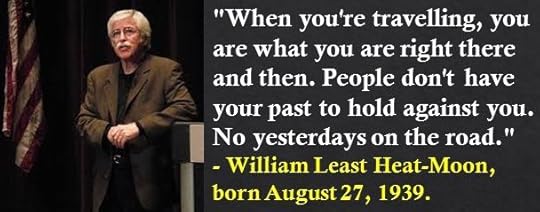

I had a powerful sense of life going about the business of getting on with itself. Pointed phallic sprouts pressed up out of the ooze, green vegetable heads came up from the mire to sniff for vegetation of kin, rising up to the thrall of the oldest rhythms. Things were growing so fast, I could almost feel the heat from their generation: the slow friction of leaf against bud case, petal against petal. For some time, I stood among the high mysteries of being as they consumed the decay of old life.There is a randomness that rules Heat-Moon's peregrinations across the country--images, bits of conversations, ideas, all in search of some structure but with randomness the overarching rule.
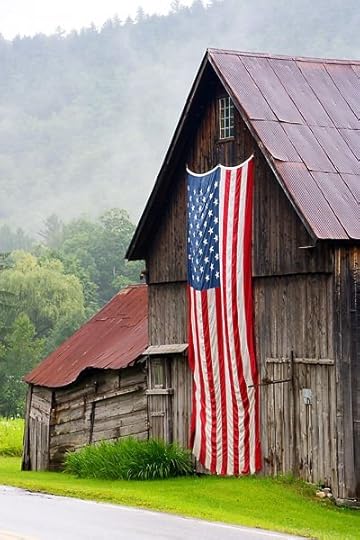
I tried to keep from looking inward, tried to look outward but as Black Elk says, certain things among the shadows of a man's life do not have to be remembered--they remember themselves. Some men take their broken marriages to church-basement workshops. I took mine to the highways & attempted to tuck it away for nearly 11,000 miles.Along the way, Heat-Moon meets Perfidio Sanchez, an Apache hitchhiker with 7 sons & 9 daughters via 5 wives, carrying his only possessions in a paper sack. The more the author explores the narrow roads, the more observant he seems to become. Unlike John Steinbeck & lacking a dog, he becomes lonely after months of rambling about, with only some frequently recited lines from Walt Whitman to keep him company. Later, he encounters a hang-glider in Washington State, someone seemingly addicted to the "life & death rush of adrenaline" that comes with jumping off a cliff.
I had poked into things along the byroads, all the while hiding from my own failure. I lost myself to the monotonous rhythm & darkness as past & present fused & dim things came & went in a staccato of moments separated by miles of darkness. On the road, where change is continuous & visible, time is not: rather, it is something the rider only infers. Time is not the traveler's fourth dimension--change is.
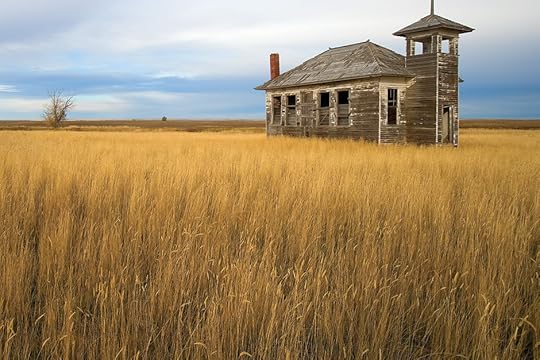
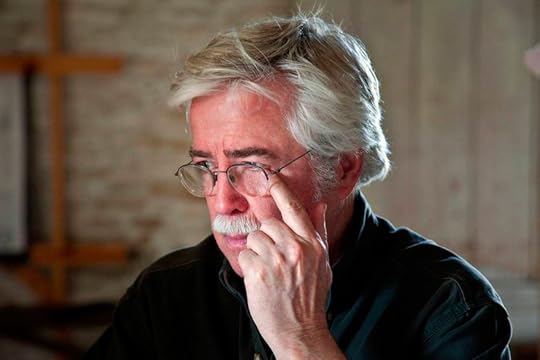
On the old highway maps of America, the main routes were red and the back roads blue. Now even the colors are changing. But in those brevities just before dawn and a little after dusk - times neither day nor night - the old roads return to the sky some of its color. Then, in truth, they carry a mysterious cast of blue, and it's that time when the pull of the blue highway is strongest, when the open road is a beckoning, a strangeness, a place where a man can lose himself.
(p 1)
1 sleeping bag and blanket;
1 Coleman cooler (empty but for a can of chopped liver a friend had given me so there would always be something to eat);
1 Rubbermaid basin and a plastic gallon jug (the sink);
1 Sears, Roebuck portable toilet;
1 Optimus 8R white gas cook stove (hardly bigger than a can of beans);
1 knapsack of utensils, a pot, a skillet;
1 U.S. Navy seabag of clothes;
1 tool kit;
1 satchel of notebooks, pens, road atlas, and a microcassette recorder;
2 Nikon F2 35 mm cameras and five lenses;
2 vade mecums: Whitman's Leaves of Grass and Neihardt's Black Elk Speaks.
(p 9)